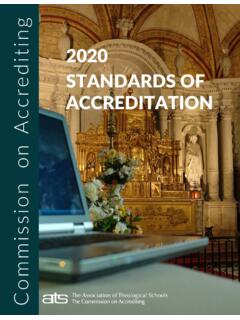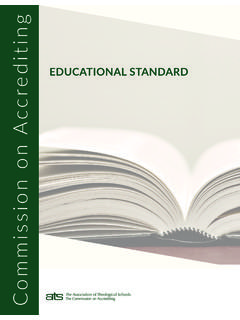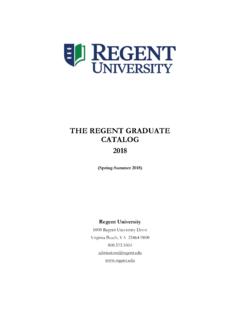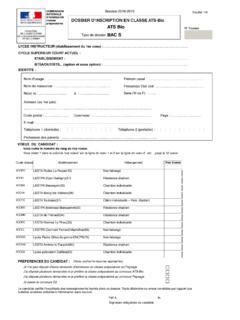Transcription of Commission on Accrediting - ATS
1 C o m m i s s i o n o n A c c re d i t i n g educational STANDARD. TABLE OF CONTENTS. Degree programs and nomenclature .. 1. Campus-based education .. 6. Extension education .. 7. Distance education .. 10. Faculty-directed individual instruction .. 13. Assessment of student learning outcomes .. 14. Academic guidelines: admission, transfer of credits, shared credit in degree programs, and advanced standing .. 16. Nondegree instructional programs .. 18. Commission ON Accrediting APPROVED 06/2012 | POSTED 06/25/15. educational STANDARD 1 of 18. ES educational Standard Applicable to All Degree Programs The educational Standard (ES 1 through 8) sets forth expectations relevant to all degree programs, including nomenclature; campus-based education; extension education; distance education; faculty- directed individual instruction; assessment of student learning outcomes; academic guidelines re- garding admission, transfer of credits, shared credit in degree programs, and advanced standing; and nondegree instructional programs.
2 Commission ON Accrediting APPROVED 06/2012 | POSTED 06/25/15. educational STANDARD 2 of 18. Degree programs and nomenclature The postbaccalaureate degree programs approved by the Board of Commissioners ( Board ) fall into several groups. It should be noted that these categories are not mutually exclusive and that there is some natural overlapping among them. Programs at the level of the first graduate theological degree are of two main kinds: (1) some oriented primarily toward ministerial leadership and (2) some oriented toward general theological studies. Programs at the advanced level, normally presupposing a first theological degree, are of two main kinds: (1). those that focus upon advanced ministerial leadership and (2) those directed primarily toward theological research and teaching.
3 When Commission institutions offer more than one degree program, they shall articulate the distinctions among the degrees with regard to their educational and vocational intent. Institutions shall articulate the goals and objectives of each degree program they offer and assure that the design of its curriculum is in accordance with the institutional purpose and the Commission standards of Accreditation. The number of students enrolled in any degree program, along with those who have a shared investment in the educational goals of that degree program ( , those with regular and substantive interaction with the learners), shall be sufficient to ensure a viable community of learning.
4 Schools shall follow the recommended nomenclature for all Board- approved degree programs. In cases where governmental licensing, charter require- ments, or institutional federation agreements preclude use of recommended nomenclature, the Board will consider alternate degree nomenclature. In cases where the standards provide alternate nomenclature for the same kind of degree program ( , MRE or MA in Religious Education, ThM or STM, PhD or ThD), the nomencla- ture employed should reflect the history or policies of the schools offering the degree programs. Degree programs shall be approved by the Board according to the Commission 's formally adopted procedures (cf. ATS Commission Policies and Procedures) and individual Degree Program standards .
5 Basic programs oriented toward ministerial leadership Curricula for programs oriented toward ministerial leadership have certain closely integrated, common features. First, they provide a structured opportunity to develop a thorough, discriminating understanding and personal appropriation of the heritage of the community of faith ( , its Scripture, tradition, doctrines, and prac- tices) in its historical and contemporary expressions. Second, they assist students in Commission ON Accrediting APPROVED 06/2012 | POSTED 06/25/15. educational STANDARD 3 of 18. understanding the cultural realities and social settings within which religious commu- nities live and carry out their missions, as well as the institutional life of those commu- nities themselves.
6 The insights of cognate disciplines such as the social sciences, the natural sciences, philosophy, and the arts enable a knowledge and appreciation of the broader context of the religious tradition, including cross-cultural and global aspects. Third, they provide opportunities for formational experiences through which students may grow in those personal qualities essential for the practice of ministry namely, emotional maturity, personal faith, moral integrity, and social concern. Fourth, they assist students in gaining the capacities for entry into and growth in the practice of the particular form of ministry to which the program is oriented. Instruction in these various areas of theological study should be so conducted as to demonstrate their interdependence, their theological character, and their common orientation toward the goals of the degree program.
7 The educational program in all its dimensions should be designed and carried out in such a way as to enable students to function con- structively as ministerial leaders in the particular communities in which they intend to work and to foster an awareness of the need for continuing education. In settings where students are preparing for ministry with cultural linguistic communities, a school should attend carefully to the characteristics of education for ministry in these contexts. The following degree nomenclature is included among these kinds of cur- ricular programs: Master of Divinity, Master of Arts in Religious Education/Master of Religious Education, Master of Arts in [area of specialization] ( , Counseling), and Master of Sacred Music/Master of Church Music.
8 Basic programs oriented toward general theological studies First graduate theological degrees in basic programs oriented toward general theological studies have in common the purpose of providing understanding in theological disciplines. These programs may be designed for general knowledge of theology, or for background in specific disciplines, or for interdisciplinary studies. They are intended as the basis for further graduate study or for other educational purposes. Nomenclature may differ according to the history of its use in the particular school. The curricula for these degrees should be developed in relation to the institution's distinctive goals for the programs. A scholarly investigation of Scripture, tradition, and theology is essential for all of the programs, while some may also emphasize research methods, teaching skills, or competence in specific theological disciplines.
9 Depending on the intention and specific context of the degree, appropriate formational experi- ences may be provided that will develop the qualities essential for the application of the degree. Adequate faculty and instructional resources must be available, with special attention given to particular areas of focus within the programs. Commission ON Accrediting APPROVED 06/2012 | POSTED 06/25/15. educational STANDARD 4 of 18. Degrees of this kind are offered with the following nomenclature: Master of Arts, Master of Arts (Religion), and Master of Theological Studies. Advanced programs oriented toward ministerial leadership Advanced programs in ministerial leadership presuppose a basic theologi- cal degree.
10 All are designed to deepen the basic knowledge and skill in ministry so that students may engage in ministry with increasing professional, intellectual, and spiritual integrity. Emphasis is upon the practice of ministry informed by analytic and ministe- rial research skills. Certain curricular features are common to the advanced programs in this category. Each degree program emphasizes the mastery of advanced knowl- edge informing the understanding of the nature and purposes of ministry, the compe- tencies gained through advanced study, and the integration of the many dimensions of ministry. Each degree program includes the completion of a final culminating written project/report or dissertation.











